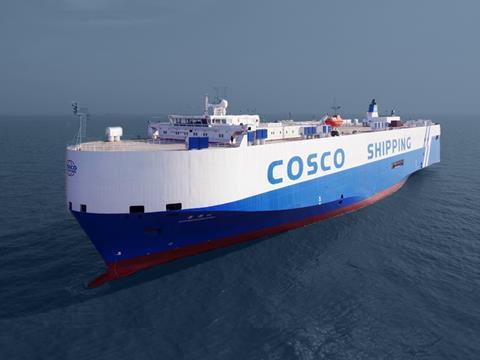Cosco Shipping Specialized Carriers has deployed two 7,500 CEU dual-fuel pure car and truck carrier (PCTC) vessels. The newly launched vessel Liao He Kou is set to embark on its journey carrying over 5,000 commercial vehicles to Europe and the Min Jiang Kou, will transport more than 4,800 commercial vehicles following the completion of loading operations in Shanghai, according to the Cosco Shipping subsidiary.

The Liao He Kou will visit the following European ports on her maiden voyage: Le Havre, France; Southampton, UK; Zeebrugge, Belgium; and Bremerhaven, Germany. The vessel is carrying vehicles for Chinese carmakers BAIC, BYD, Chery and Liuzhou.
Each of the new vessels measures almost 200 metres in total length and 38 metres wide, with 13 decks, four of which are rise and fall, meaning the vessels can accommodate passenger, vehicles trucks and rolling machinery.
Since 2022, Cosco Shipping Specialized Carriers and its joint venture, Guangzhou Yuanhai Automobile Shipping, has ordered 24 large-scale LNG dual-fuel ro-ro ships with capacities ranging from 7,000 to 8,600 parking spaces. The company said that in the second half of this year five new vessels will be delivered, with 11 more ships expected next year, followed by an additional six ships by 2026.
Cutting the carbon
The division said the vessels have been designed to meet stringent Tier III emission standards established by the International Maritime Organization (IMO). Compared to traditional vessels running on heavy bunker oil, they will cut carbon, nitrogen and sulphur emissions, as well as particulate matter. The vessels are saving 20% in energy consumption.
Emissions savings in numbers
27% carbon emissions
30% nitrogen oxide emissions
99% sulphur emissions
90% particulate matter emissions
2,100 tons of CO2 emissions saved per voyage
Cosco Shipping Specialized Carriers said that using LNG as an alternative fuel a typical round-trip voyage from China to Europe the vessels can reduce CO2 emissions by more than 2,100 tons per voyage. The company said that the carbon emission intensity of the company’s fleet decreased by 5.79% year-on-year in 2023 and by 2025, with the launch of new LNG dual-fuel vessels, it is expected to further reduce carbon emission intensity by 35.25% compared to 2022.
Digital platform
The company also said that it had built a comprehensive digital platform that includes visual cargo hold CCTV monitoring, power battery data surveillance and an early warning system that can monitor up to 5,000 battery EVs, addressing the need for large-scale battery temperature monitoring.
The CCTV monitoring technology enables Cosco Shipping to locate precisely the position of vehicles during transport on a ‘one vehicle, one code, one spot’ basis.
Cosco said it has also pioneered the use of the NFP algorithm in an intelligent ship stowage system. That enables “rapid simultaneous stowage across multiple ships and tasks, as well as one-click stowage for the entire vessel”.
Since April 2023, Yuanhai Automobile Shipping has successfully issued over 70 blockchain-based electronic bills of lading for PCTCs, covering more than 15,000 commercial vehicles. The company said that significantly enhanced document circulation efficiency throughout the entire chain, reducing the risk of document loss and elevating customer service experience.

























![Global[1]](https://d3n5uof8vony13.cloudfront.net/Pictures/web/a/d/s/global1_726550.svgz)













No comments yet